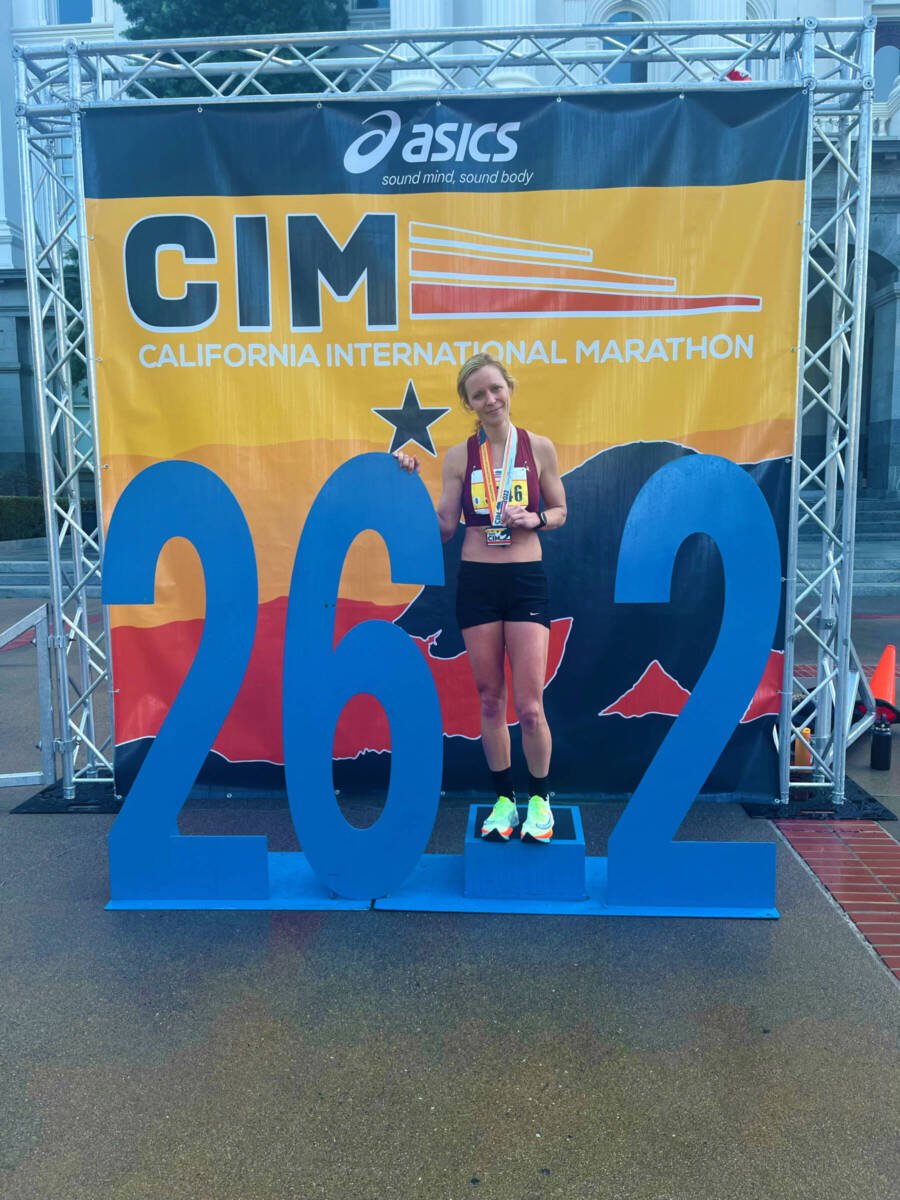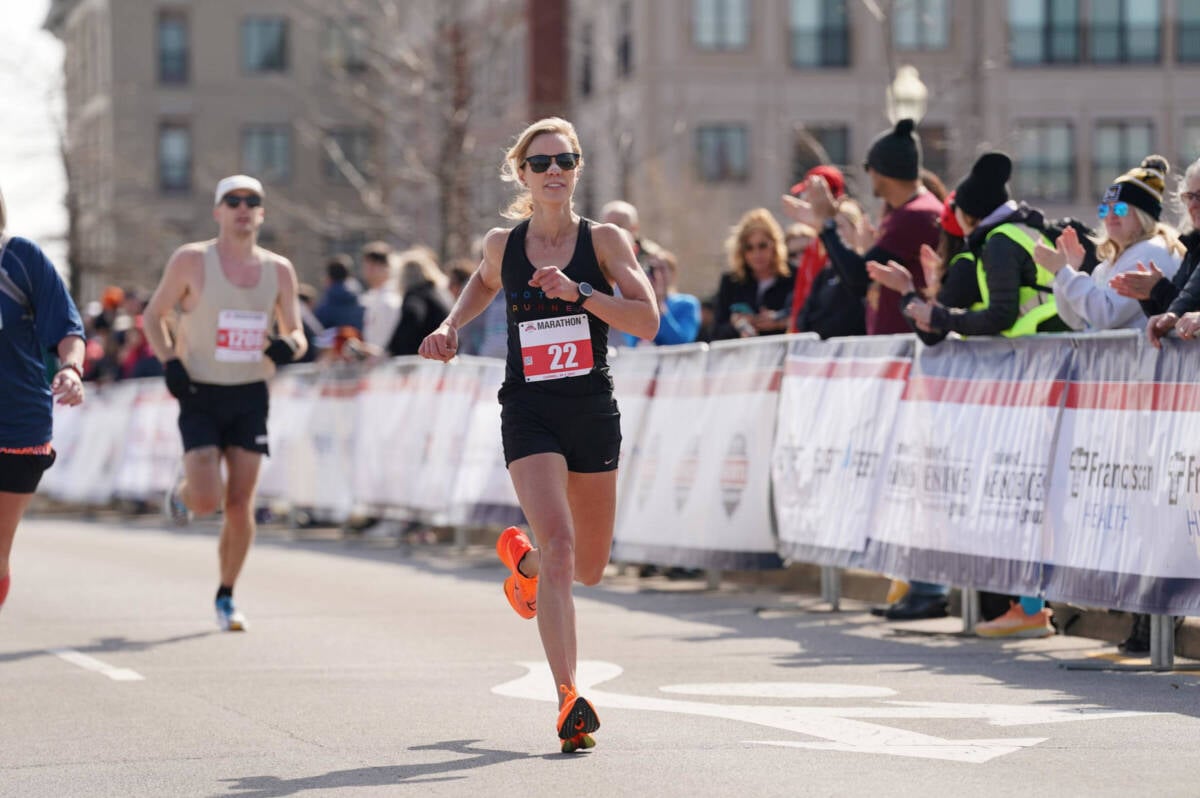8 Marathon Recovery Tips to Recover Faster

Running a marathon is an amazing physical and mental achievement, one that requires an ample amount of time to recover. However, many marathon runners run a marathon only to be eager to jump right back into training—ignoring the best marathon recovery tips: REST and RECOVER. It’s important to know that your body undergoes significant trauma when running a marathon. Studies show the damage from a marathon can last up to a month.
Marathoners think they can capitalize on their marathon fitness or are eager to improve that PR or seek redemption from a bad race. That’s a mistake. I made this mistake in 2019. I had trained and run the 2019 Indianapolis Monumental Marathon with a partially torn hamstring. I ran a 2:56, 11 minutes above my goal time. Instead of taking time off to recover and HEAL, I jumped right back into running. You can guess what happened? I didn’t heal and ended up having to rehab a full year.
Taking time off after a marathon is CRUCIAL regardless of having an injury.
The fastest way to recover from a marathon is to focus on your marathon recovery. That is sleep, eat, drink, and rest. But there are also some marathon recovery tips that can expedite the post-marathon process.
Table of contents
8 Marathon Recovery Tips to Recover Faster
Consume carbohydrates during the race.
Studies show that fueling well during your marathon will not only help your performance but will also help you recover faster from your marathon. Consuming carbs during your marathon prevents your body from synthesizing protein from your muscles for energy. Thus, you have less muscle damage than if you did not fuel adequately.
Aim for 60 grams of carbs per hour of your marathon.
Consider ketones.
Ketones have been shown to help increase recovery after a hard effort such as a marathon. Ketones are acids your body makes when it’s using fat instead of glucose for energy. They have been shown to help replenish muscle glycogen (much like eating carbs post-race can do), repair muscles by reducing protein oxidation, reduce central and peripheral fatigue, improve sleep, and increase energy intake.
Keep moving.
Immediately after running a marathon, don’t sit down! Keep moving and walking around for the first five to ten minutes. Keeping your body moving will increase blood flow and prevent cramping. During the week after your marathon, do light exercise like walking, cycling, or swimming, to keep this process going–helping to repair damaged muscle fibers. More blood flow to the area means more nutrients can be delivered to the muscles and more waste products can be cleared from the muscles.
Stretch & mobilize.
Once you’re in the state of recovery take the next 15-20 minutes to stretch focusing on hamstrings, hip flexors, quadriceps, calves, and opening up your upper body (chest, core, obliques, arms). Continue to stretch and focus on mobility for runners in the days following running a marathon, taking 10 to 15 minutes a day focusing on the main muscle groups. For instance, on day 1 focus on calves and hamstrings. Day 2, focus on feet, glutes, and low back.
Drink water and eat pizza.
Immediately after running the marathon, replace depleted muscle glycogen by consuming carbohydrate-packed foods such as the post-race bananas and bagels. Nutritionist Amy Stephens says to also start rehydrating with 10-20 ounces of water.
In the days following, drink lots of water, eats lots of protein and carbs, and avoid sugary foods that can increase inflammation. Anti-inflammatory foods like berries, nuts, and fish can help fight DOMS.
Hold the post-marathon beer.
You can drink a beer after the marathon, but not until you’ve rehydrated, say Stephens. Alcohol like beer interferes with the glycogen replacement your body needs. Your body needs water and carb-heavy foods to do this.
So, sip the water and sports drinks or juice immediately afterward. Then eat a pizza or pasta to help restock that those glycogen stories. Then go ahead and grab a beer to celebrate while continuing to hydrate with water.
Prioritize rest and recovery.
Sleep is the most important performance and recovery tool in your arsenal. During deep sleep, growth hormone is released which stimulates muscle growth and repair. Not getting enough sleep can result in slower muscle recovery, increased levels of stress hormones, and increased perception of exercise difficulty.
Studies show athletes who sleep on average less than 8 hours per night have 1.7 times greater risk for injury than those who sleep at least 8 hours. (Naps help, too!). Don’t feel “lazy” about resting up, it’ll help you get back to marathon training faster!
Also consider using a recovery tool such as the Firefly Recovery which I have personally found can really help make your legs less sore. Compression boots can also help speed up recovery.
Don’t run.
Resist the urge to run in the week after your marathon. Many marathoners on a marathon-high are eager to start training for their next race and capitalize on their training. This is risky. Runners need at least one full week of recovery after a marathon to safely return to running. Studies show bodies take 4 weeks or so to fully recover from a marathon.
“Unfortunately, not taking enough time to fully recover after a marathon often leads to overtraining and injuries. Not only does resting for seven to ten days have a little negative impact on your current fitness, but the long-term gains will also outweigh any temporary reduction in fitness,” explains famed running coach Jeff Galloway.
Post Marathon Recovery Timeline
Here is how the average runner should spend their weeks after running a goal -race marathon:
- Week 1: Focus on sleeping, eating, and drinking. No running. But you can do easy walking, light exercise that promotes blood flow, stretching, foam rolling, and massage. Continue to hydrate and eat healthy foods including ample amounts of protein and carbs.
- Week 2: Continue to focus on recovery. If you choose to resume running, you may do 3 or so easy runs of 30-45 minutes. You may resume weightlifting.
- Week 3: Continue focus on recovery. You may increase your runs up to 60 minutes at half of your previous mileage.
- Week 4: You may continue the daily easy running of 50-60 percent of your base building mileage.
- Week 5: You may begin your next structured training plan with base-building easy runs and some strides. No workouts of tempos or progression runs just yet.
Post-Marathon FAQs
How long will I be sore after a marathon?
People who run a marathon expect to be sore for 5 days after a marathon. They may experience Delayed-Onset Muscle Soreness, or DOMS, which is muscles soreness that comes on days after the triggering event.
Most people experience DOMS 24-72 hours after a marathon or hard workout with the feeling of sore, tight, stiff, and painful muscle aches. The muscle soreness usually lasts between 3-5 days.
How long are you tired after a marathon?
Most people will be tired for several days after a marathon and sore for 5 days. Marathoners need to take at least a week completely off running to allow their bodies to recover.
How long does it take to fully recover from a marathon?
Studies show there is muscle damage done during marathon training and the marathon duration itself. Other studies show there is still evidence of damaged tissue (in the form of the enzyme creatinine kinase (CK) and increased myoglobin levels in the bloodstream) in the bloodstream one week after running a marathon.
Another study found evidence of CK 4 weeks after a marathon. Therefore, it is generally believed it takes a person an average of 4 weeks to fully recover from running a marathon.
What happens to your body after you run a marathon?
Significant trauma and stress are placed upon the body when you run a marathon. This is what happens to your body after you run a marathon:
- You cause damage to your muscles, tendons, ligaments, and bones.
- Your immune system becomes temporarily comprised for 3-72 hours after running a marathon due to stress hormones being in a state of dysfunction.
- You can experience kidney damage drink 48 hours after.
- You may have post-marathon blues.
- There is a potential for weight gain because your body is holding onto extra water to help repair your body. (Remember: you store an extra 3 ounces of water for every ounce of glycogen).
“Exercise increases inflammation—microscopic muscle damage and inflammation. The body retains water to help heal it,” explains nutritionist Kristy Baumann.
How much time should I take off after running a marathon?
As noted, a marathon causes damage to the cardiac muscles, musculoskeletal system, and even kidneys. Thus, it is advised athletes take 1-2 weeks off running after running a marathon. As a running coach, I strongly encourage my runners to take at least one week off–no matter how effective these marathon recovery tips may be! Allowing your body a long period to recover aids in healing, as your body can repair damaged tissue and return biomarkers such as creatine kinase and troponin to healthy levels.
Runners who do not take time off running after running a marathon risk:
- Injury
- Overtraining
- Mental burnout
- Decrease performance
- Illness
How much time off do you take after a marathon?
.






